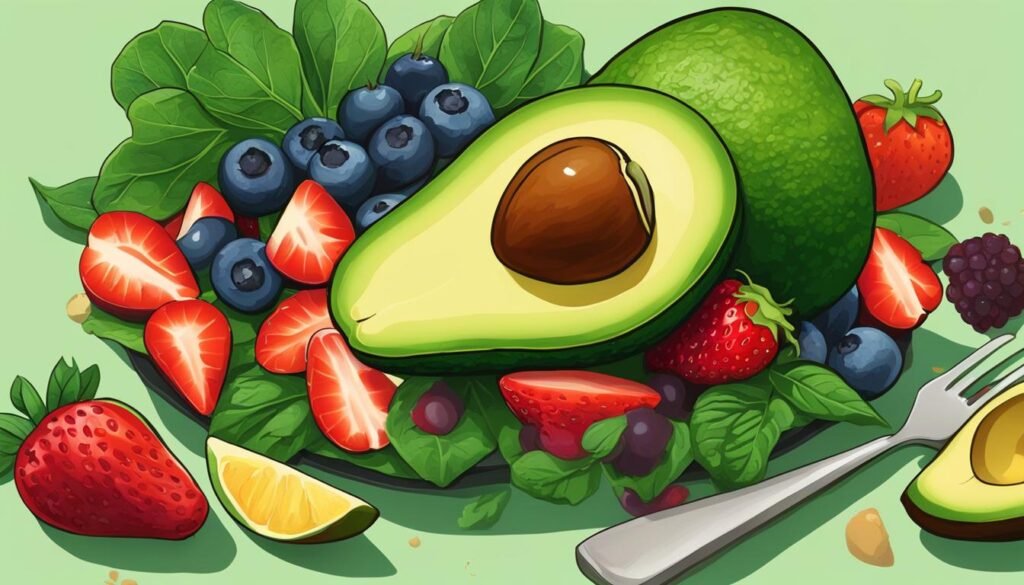As we age, prioritizing proper nutrition becomes increasingly important for supporting our overall health and well-being. The choices we make in our diet can have a significant impact on healthy aging. Incorporating superfoods into our meals can provide a wealth of benefits, boosting our nutrition and helping us thrive in later years.
Senior nutrition plays a vital role in maintaining optimal health as we grow older. A nutrient-rich diet can help reduce the risk of chronic diseases, strengthen the immune system, improve cognitive function, and promote healthy aging. By understanding the importance of nutrition and embracing the power of superfoods, we can unlock the potential for a vibrant and fulfilling life in our later years.
Key Takeaways:
- Prioritizing nutrition is essential for healthy aging
- Incorporating superfoods into our diets can provide numerous health benefits
- Senior nutrition plays a vital role in supporting overall health and well-being
- A nutrient-rich diet can reduce the risk of chronic diseases and boost immune function
- Embracing the power of nutrition and superfoods can lead to a vibrant life in later years
What Are Super Greens and Their Benefits?
Super greens are nutrient-dense green vegetables and plants that are packed with vitamins, minerals, and antioxidants. These powerhouse foods offer a wide range of health benefits, making them particularly beneficial for older adults looking to boost longevity through nutrition.
Examples of super greens include:
- Spinach
- Kale
- Spirulina
- Chlorella
- Wheatgrass
When incorporated into a regular diet, super greens can enhance digestion, boost immunity, support detoxification, and increase energy levels. They are also rich in fiber, which aids in maintaining a healthy weight and promoting regular bowel movements.
Adding super greens to your meals can be as simple as tossing a handful of spinach or kale into your smoothie or salad. Alternatively, you can also find super greens powder supplements that can easily be mixed into juices or water for a convenient boost of nutrition. Investing in your health by incorporating these super greens into your diet is a small step with significant potential benefits.
Spotlight on Bloom Nutrition Super Greens Powder Smoothie & Juice Mix
In our quest for optimal nutrition and healthy aging, we came across Bloom Nutrition Super Greens Powder Smoothie & Juice Mix. This premium product stands out with its blend of nutrient-rich super greens, offering a convenient and delicious way to fuel your body as you age.
What sets Bloom Nutrition Super Greens Powder apart is its diverse nutrient profile. This powder combines a variety of super greens, including spinach, kale, spirulina, chlorella, and wheatgrass, to provide a potent dose of vitamins, minerals, and antioxidants. These powerful ingredients can help support a healthy immune system, enhance digestion, detoxify the body, and boost energy levels.
Not only does Bloom Nutrition Super Greens Powder offer a robust nutrient profile, but it also excels in versatility. You can easily incorporate this powder into your daily routine by adding it to smoothies, juices, or even water. The pleasant taste makes it a palatable choice, ensuring that you can enjoy the benefits of super greens without sacrificing flavor.
| Nutrient Content | Amount per Serving |
|---|---|
| Vitamin C | 100% of daily recommended intake |
| Vitamin A | 80% of daily recommended intake |
| Fiber | 6 grams |
| Iron | 15% of daily recommended intake |
When it comes to supporting healthy aging and overall well-being, Bloom Nutrition Super Greens Powder Smoothie & Juice Mix is a valuable addition to your daily routine. With its nutrient-rich formula, versatile usage options, and delightful taste, it offers a convenient way to ensure you’re fueling your body with the essential nutrients it needs.
The Rise of Superfood Powders: Do They Live Up to the Hype?
Superfood powders have become increasingly popular in recent years, promising a range of health benefits and an easy way to incorporate superfoods into your diet. Brands like Athletic Greens, Daily Greens, and Supergreens claim to provide a concentrated dose of nutrients, antioxidants, and other beneficial compounds that can boost energy levels and improve overall health. But do these powders really live up to the hype?
While superfood powders may contain a variety of vitamins, minerals, and antioxidants, it is important to note that their specific health benefits are often exaggerated. Many of the claims made by these brands are not backed by strong scientific evidence. It’s important to remember that no single food or supplement can magically transform your health overnight.
Instead of relying solely on superfood powders, health experts recommend focusing on a balanced diet that includes a wide variety of nutrient-rich foods. This means incorporating whole grains, lean proteins, fruits, vegetables, and healthy fats into your meals. By doing so, you can ensure that you’re getting a comprehensive range of nutrients that support good health and energy levels.
While superfood powders can be a convenient addition to your diet, they should not replace whole foods. It’s important to consult with a healthcare professional or registered dietitian before incorporating any new supplements into your routine. They can help guide you towards the best choices for your individual needs and goals.
Table: A Comparison of Popular Superfood Powders
| Brand | Main Ingredients | Health Claims | Scientific Evidence |
|---|---|---|---|
| Athletic Greens | Various superfood extracts and antioxidants | Improved energy, enhanced immune function, detoxification | Limited scientific evidence to support specific health claims |
| Daily Greens | Blend of green vegetables and fruits | Increase nutrient intake, support digestion and detoxification | Minimal scientific research on specific health benefits |
| Supergreens | Mixture of green superfoods like spirulina and chlorella | Boosted immunity, improved overall health and vitality | Insufficient scientific evidence to support health claims |
Table: A comparison of popular superfood powders and their health claims. While these powders may contain beneficial ingredients, it is important to note that the scientific evidence supporting their specific health claims is limited. Incorporating a variety of whole foods into your diet remains the best way to fuel your body and support overall health.
The Truth About Kale: A Superfood or Just Another Green?
When it comes to healthy greens, kale often takes the spotlight as a superfood. But is it really superior to other vegetables in terms of its nutrient content? Let’s take a closer look at the truth about kale and its role in a balanced diet.
Kale is undeniably nutritious, offering a range of vitamins, minerals, and fiber. It contains calcium for bone health, vitamin B6 for brain function, vitamin A for eye health, and vitamin C for immune support. Additionally, its fiber content promotes healthy digestion. However, it’s important to note that other vegetables like broccoli, spinach, and brussels sprouts also provide similar or even higher levels of these nutrients.
While kale certainly has its nutritional benefits, it’s not significantly superior to other vegetables. Eating a variety of greens is key to obtaining a well-rounded nutrient profile. So, instead of focusing solely on kale, we recommend incorporating a mix of different vegetables into your meals to ensure you’re getting a broad range of nutrients.
Remember, there’s no single food that can magically solve all our health concerns. A balanced diet that includes a variety of nutrient-rich foods, along with regular exercise, remains the cornerstone of good health. So, enjoy kale as part of your overall dietary pattern, but don’t forget to explore the diverse array of greens available for a truly nourishing and satisfying eating experience.
Table: Nutrient Comparison of Kale and Other Greens
| Nutrient | Kale (1 cup) | Broccoli (1 cup) | Spinach (1 cup) | Brussels Sprouts (1 cup) |
|---|---|---|---|---|
| Calcium | 101mg | 43mg | 30mg | 37mg |
| Vitamin B6 | 0.2mg | 0.2mg | 0.2mg | 0.2mg |
| Vitamin A | 885mcg | 567mcg | 469mcg | 469mcg |
| Vitamin C | 80.4mg | 81.2mg | 8.4mg | 74.8mg |
| Fiber | 2.6g | 2.6g | 2.2g | 2.6g |
“While kale certainly has its nutritional benefits, it’s not significantly superior to other vegetables.” – Nutritionist
Exploring the Health Benefits of Avocado
Avocado is a unique fruit that offers a range of potential health benefits. One of the standout features of avocado is its high monounsaturated fat content. Monounsaturated fats are considered healthy fats that can have a positive impact on cardiovascular health. These fats have been shown to lower bad cholesterol levels, reduce the risk of heart disease, and improve overall heart health.
While avocados are high in calories, they are also packed with essential nutrients. They contain vitamins such as vitamin K, vitamin E, and vitamin C, as well as minerals like potassium and magnesium. Avocados are also a good source of dietary fiber, which can aid in digestion and promote a feeling of fullness.
Research on the specific health benefits of avocado is still ongoing, but preliminary studies suggest that regular avocado consumption may help reduce inflammation, improve insulin sensitivity, and support weight management. It’s important to note that these studies are limited in scope and more research is needed to fully understand the impact of avocados on overall health.

Incorporating avocados into your diet is easy and versatile. You can enjoy avocados sliced on toast, added to salads, mashed into guacamole, or used as a substitute for butter or mayonnaise in recipes. However, it’s important to practice moderation due to their calorie density. Adding a half or a quarter of an avocado to your meals can provide the health benefits without excessive calorie intake.
Overall, while avocados show promise as a heart-healthy food, it’s important to remember that they are just one part of a balanced diet. Incorporating a variety of fruits, vegetables, whole grains, lean proteins, and healthy fats is essential for optimal cardiovascular health and overall well-being.
The Mystique of Pomegranates: More Than Just a Pretty Fruit?
When it comes to pomegranates, their vibrant color and sweet taste often grab our attention. But beyond their aesthetic appeal, pomegranates have been touted for their potential health benefits. These fruits are rich in antioxidants, which are compounds that help protect our cells from damage caused by harmful free radicals. Antioxidants play a crucial role in maintaining cardiovascular health, among other benefits.
A study published in the American Journal of Clinical Nutrition found that regularly consuming pomegranate juice helped reduce cholesterol oxidation, a major contributor to the development of cardiovascular disease. Another study published in the journal Atherosclerosis showed that pomegranate extract may help improve blood pressure levels and overall heart health.
While the evidence for these claims is promising, it is important to note that more research is needed to fully understand the impact of pomegranate consumption on cardiovascular health. In the meantime, incorporating pomegranates into your diet can be a delicious and nutritious way to support your overall well-being.
Table: Pomegranate Nutritional Profile
| Nutrient | Amount per 100g |
|---|---|
| Calories | 83 |
| Carbohydrates | 18.7g |
| Fiber | 4g |
| Vitamin C | 10.2mg |
| Potassium | 236mg |
| Antioxidants | Ellagic acid, punicalagins |
In addition to their potential cardiovascular benefits, pomegranates are also a good source of vitamin C, fiber, and potassium. Vitamin C is essential for immune function and collagen production, while fiber helps support digestion and promotes satiety. Potassium is vital for maintaining proper fluid balance, nerve function, and muscle contractions.
So, while pomegranates may be more than just a pretty fruit, it’s important to remember that they are just one piece of the nutritional puzzle. A well-rounded diet that includes a variety of fruits, vegetables, whole grains, lean proteins, and healthy fats is still the key to supporting overall health and well-being.
Debunking the Hype Around Goji Berries
Goji berries have gained popularity in recent years as an antioxidant-rich fruit with numerous health benefits. However, it is important to approach the hype around goji berries with caution. While they are indeed a nutritious addition to a balanced diet, the specific health benefits attributed to goji berries may be exaggerated.
Goji berries are often touted for their high antioxidant content, which can help protect cells from damage caused by harmful free radicals. They are also a good source of vitamins A and C, as well as fiber. These nutrients are essential for overall health and can support a strong immune system and healthy digestion.
However, it is worth noting that goji berries are not a magical cure-all. While some studies suggest that goji berries may have potential benefits for eye health, immune function, and skin health, the evidence is limited and more research is needed to fully understand the impact of goji berry consumption on these specific areas.
Table: Nutritional Information of Goji Berries
| Nutrient | Amount per 100g |
|---|---|
| Calories | 349 |
| Protein | 14.3g |
| Fat | 0.39g |
| Carbohydrates | 77g |
| Fiber | 10g |
| Vitamin A | 26822 IU |
| Vitamin C | 48.4mg |
“While goji berries may offer certain health benefits, it is important to maintain a varied and well-rounded diet to support overall health and well-being.” – Nutritionist
The bottom line is that goji berries can be a healthy addition to your diet, but they should not be relied upon as a sole source of nutrition. It is essential to consume a wide variety of fruits, vegetables, whole grains, lean proteins, and healthy fats to ensure you are getting all the necessary nutrients for optimal health. As always, consulting with a healthcare professional or registered dietitian can provide personalized guidance on incorporating goji berries and other superfoods into your diet.

Conclusion
As we age, it is crucial to prioritize proper nutrition and consciously make choices that support healthy aging. While superfoods like kale, avocados, pomegranates, and goji berries may offer potential health benefits, they should not be viewed as a substitute for a well-rounded and nutrient-rich diet. Incorporating a variety of fruits, vegetables, whole grains, lean proteins, and healthy fats into our meals is key to fueling our bodies as we age.
It is important to remember that healthy aging is about more than just individual superfoods; it is about adopting a holistic approach to nutrition. No single food or supplement can provide all the necessary nutrients for optimal health. Therefore, we should strive to maintain a balanced and varied diet to ensure we are meeting our nutrient needs.
When incorporating superfoods into our diet, it is essential to consult with a healthcare professional to ensure they align with our specific health conditions and goals. They can provide personalized recommendations and guidance on how to best incorporate superfoods into our meals.
Embracing the power of nutrition and incorporating superfoods into our diet can help support healthy aging and enhance our overall well-being. By prioritizing a nutrient-rich diet and making conscious choices, we can fuel our bodies for a healthier and more vibrant life in later years.
FAQ
What are superfoods for older adults?
Superfoods for older adults are nutrient-dense foods that provide a wide range of health benefits, such as boosting immunity, enhancing digestion, and increasing energy levels.
How can superfoods contribute to healthy aging?
Superfoods can contribute to healthy aging by providing essential vitamins, minerals, and antioxidants that support overall health and well-being.
What is Bloom Nutrition Super Greens Powder Smoothie & Juice Mix?
Bloom Nutrition Super Greens Powder Smoothie & Juice Mix is a high-quality product that combines various super greens to provide maximum health benefits. It can be easily incorporated into your daily routine to ensure you’re getting the necessary nutrients for healthy aging.
Do superfood powders live up to the hype?
While superfood powders may contain trendy ingredients and claim to provide numerous health benefits, there is limited scientific evidence to support these claims. It is generally recommended to focus on a balanced diet and regular exercise for overall health.
Is kale a superfood?
Kale is often hailed as a superfood due to its nutritional content. However, it is important to note that other vegetables like broccoli, spinach, and brussels sprouts offer similar or even higher levels of nutrients. Eating a variety of vegetables is key for a balanced diet.
What are the health benefits of avocado?
Avocado is rich in monounsaturated fats, which can benefit cardiovascular health. However, moderation is key due to its high calorie content. While some studies suggest potential health benefits, more research is needed for a definitive understanding.
Do pomegranates have specific health benefits?
Pomegranates are rich in antioxidants and have been suggested to improve cardiovascular health. However, the evidence for these claims is not definitive, and further research is needed.
Do goji berries have unique health benefits?
Goji berries are considered antioxidant-rich fruits, but there is limited scientific evidence to support the specific health benefits attributed to them. A well-rounded diet is important for overall health.
How can I support healthy aging through nutrition?
To support healthy aging, it is important to prioritize nutrition by incorporating a variety of fruits, vegetables, whole grains, lean proteins, and healthy fats into your meals. Consult with a healthcare professional before making any significant changes to your diet.






